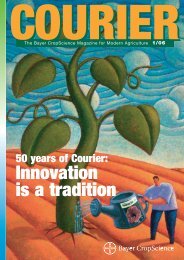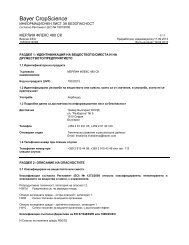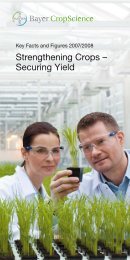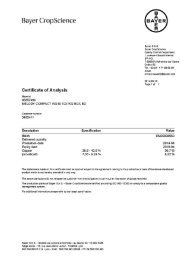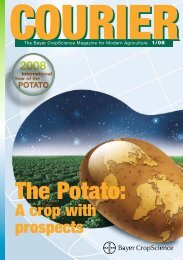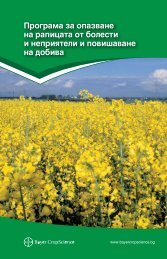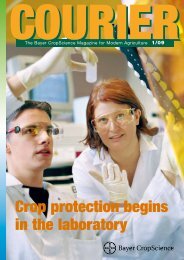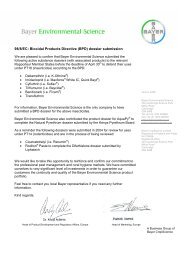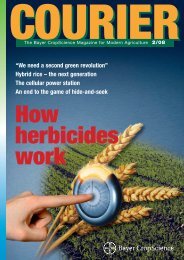For healthy potatoes - Bayer CropScience
For healthy potatoes - Bayer CropScience
For healthy potatoes - Bayer CropScience
Create successful ePaper yourself
Turn your PDF publications into a flip-book with our unique Google optimized e-Paper software.
We need to have a good<br />
idea of future needs to<br />
guide research starting<br />
now as new products<br />
commonly take over a<br />
decade to develop before<br />
they reach users.<br />
Overall, any credible vision of the<br />
future of global farming needs to accommodate<br />
an expanding demand for both<br />
food and non-edible crops produced sustainably<br />
– against a background of food<br />
and non-food crop demand, population<br />
growth, climate change and diminishing<br />
natural resources such as biodiversity, land,<br />
soil, energy, and water. Clearly, steady and<br />
substantial gains in crop productivity will<br />
be essential, and this is most likely to be<br />
achieved through knowledge-based agricultural<br />
intensification, using state-of-theart<br />
science and technology, accompanied<br />
by improved capacity building.<br />
While understanding that technical<br />
solutions form only a part of what is necessary<br />
to address all challenges <strong>Bayer</strong><br />
<strong>CropScience</strong> can contribute to a variety of<br />
aspects that will be key to improving farm<br />
productivity in future. As a technology and<br />
service provider for agriculture we have<br />
considerable skills and resources to contribute<br />
to rural and economic development.<br />
But there are clearly other limiting factors:<br />
we look to governments to provide the necessary<br />
enabling environment required for<br />
business to operate effectively in a strong<br />
and stable political, legal and economic<br />
context. Improved governance, linked to<br />
the rule of law and democratic processes,<br />
is of fundamental importance as is sustained<br />
investment in rural infrastructure<br />
and capacity building. Better access to<br />
domestic and international markets and<br />
open trade can also play a crucial role in<br />
improving the profitability of agriculture<br />
and the welfare of rural communities but<br />
must be underpinned by appropriate<br />
polices and incentives. With these political<br />
issues addressed, the scope for innovative<br />
technologies to make a major contribution<br />
becomes far more feasible and likely.<br />
Production of biofuel is increasing rapidly.<br />
Plant breeding, biotechnology<br />
and crop protection products<br />
Particularly important in the medium and<br />
long term is the progress made possible by<br />
advances in crop genomics that will provide<br />
the springboard for the development<br />
of enhanced crop production. Greater<br />
understanding of the molecular basis of all<br />
aspects of a plant’s physiology and its controlling<br />
genome will enable the development<br />
of enhanced crop varieties and the<br />
development of crop protection products<br />
with innovative modes of action.<br />
About half of the past increase in agricultural<br />
productivity is estimated to have<br />
come from higher yielding crop varieties,<br />
but the gains using traditional plant breeding<br />
technology seem to be close to a ceiling<br />
with most major crops. From a sustainability<br />
viewpoint, novel crop varieties that<br />
use resources more efficiently and more<br />
sustainably are the promise. This also<br />
includes varieties that are less stressed by<br />
temporary water shortages or need less fertiliser<br />
or pesticides to grow. Biotechnology<br />
is making it possible to produce a vast<br />
range of products from plants that could<br />
replace products now derived from nonrenewable<br />
raw materials (such as special<br />
oils). Starches, proteins, biodegradable<br />
plastics and other biomaterials derived<br />
from improved plants will also become<br />
important in future to optimise processing<br />
in downstream industries. However, as<br />
with biofuels, the question of the future<br />
competition with food production for land<br />
and other resources raises some question<br />
marks.<br />
Consumer acceptability of biotechnology<br />
crops need to be respected and <strong>Bayer</strong><br />
BioScience is addressing this at a very<br />
early stage of R&D and through stakeholder<br />
engagement at various levels so that<br />
mutual understanding and knowledge sharing<br />
can contribute to making informed<br />
choices of this technology that will surely<br />
be essential to meet future global needs.<br />
Improved land management,<br />
including conservation farming<br />
techniques<br />
Farming has become more knowledge<br />
based and today addresses economic,<br />
social and environmental challenges in a<br />
much better holistic and integrated way<br />
than a few decades ago. In many respects<br />
the prospects for developing innovative<br />
land management approaches, including<br />
conservation farming techniques that<br />
reduce water run-off, soil erosion, fuel use<br />
for tractor operations and contribute to carbon<br />
sequestration are key. Improving the<br />
26 COURIER 2/06



